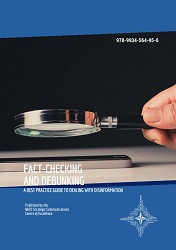Fact-checking and Debunking. A Best Practice Guide to Dealing with Disinformation
Fact-checking and Debunking. A Best Practice Guide to Dealing with Disinformation
Author(s): James Pamment, Anneli Kimber Lindwall
Subject(s): Social Sciences, Media studies, Communication studies, Sociology, Theory of Communication, Crowd Psychology: Mass phenomena and political interactions
Published by: NATO Strategic Communications Centre of Excellence
Keywords: Misinformation; disinformation; fact-checking; debunking; information environment; deceiving the public; media;
Summary/Abstract: Misinformation and disinformation disseminated online are a relatively recent phenomena, as are initiatives developed to limit the effect of such content. Questions remain over the effectiveness of two key counter-measures, fact-checking and debunking. This report makes a start in examining best practice: what it is, who does it and how it might be evaluated. Today’s information environment is increasingly characterised by the spread of misinformation and disinformation. Misinformation refers to verifiably false information that is spread without any intent to mislead. Disinformation refers to the creation, presentation and dissemination of verifiably false information for economic gain or to intentionally deceive the public. Whether it be published in a news article or an online blog, broadcast from a newsroom or government press conference, misleading and false information is frequently produced and reproduced, both intentionally and unintentionally.
- Print-ISBN-13: 978-9934-564-95-6
- Page Count: 51
- Publication Year: 2021
- Language: English
- eBook-PDF
- Introduction
- Table of Content

